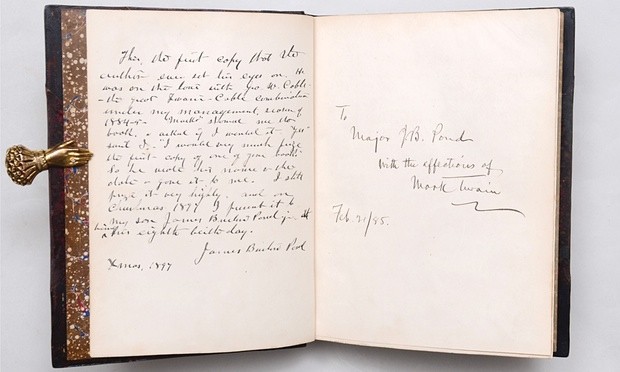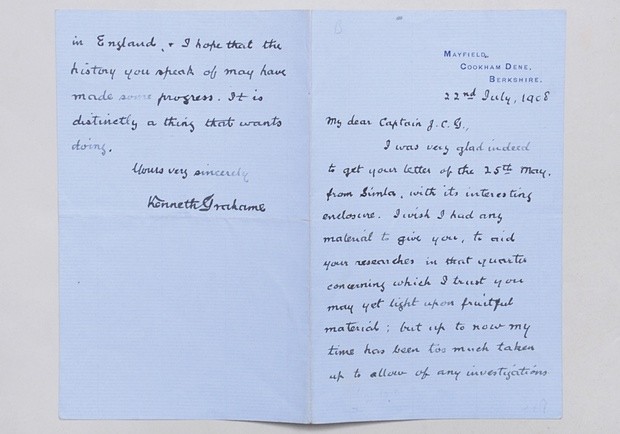T.S Eliot’s The Waste Landcopy inscribed by him to hist herapist for sale

In December 1923, TS Eliot wrote of his “enduring gratitude” to the therapist who helped him through a nervous breakdown while he was writing The Waste Land, in one of about 460 copies hand-printed by Virginia and Leonard Woolf, now one of a number of remarkable titles that have been put up for sale in London.
Dr Roger Vittoz ran the private Lausanne clinic where Eliot was treated in 1921. Eliot had taken a leave of three months from Lloyd’s Bank, with “nervous breakdown” given as the reason on his staff card. While in Lausanne, he would write a 19-page version of The Waste Land, with Ezra Pound then subjecting it to a detailed edit on his return to London in 1922.
Vittoz’s signed copy, which was passed to an academic, has just been put up for sale by rare bookseller Peter Harrington as part of its new catalogue. Peter Harringon called the copy’s dedication “a remarkable association, arguably second only in importance to the dedication copy inscribed to Pound”.
“The doctor used to make him recite soothing words,” said bookseller Adam Douglas. “And the poem ends ‘shantih, shantih, shantih’ [the Sanskrit word for peace] … Eliot really did find the therapy useful, and The Waste Land marks a turning point, not only as the start of modernism, but it laid the foundations for the rest of his career.”
In its catalogue, Peter Harrington points to Matthew Gold’s paper Therapeutic Possibilities of The Waste Land, in which Gold says that “it seems appropriate that … a text which ushered in a new modern literature characterised by disjointed narration, fragmented identities and splintered religious faith was written by a man in the midst of a nervous breakdown”.
Vittoz’s role in the composition of the text, adds Gold, “has been studied only vaguely” but “if Pound was the midwife of the poem … then Dr Vittoz was the anaesthesiologist on call during the delivery, guiding Eliot through the birthing process and slipping him an epidural when the pain became too great. Vittoz’s therapeutic program re-educated Eliot’s broken will and enabled him to complete his work. The Waste Land stands as a record of Eliot’s sickness and his cure.”
Peter Harrington’s new catalogue also features a copy of the Fourth Folio of Comedies, Histories and Tragedies by William Shakespeare from 1685 (£125,000), a first edition of Crusade in Europe by Dwight Eisenhower from 1948, inscribed to Clement Attlee and his wife “from their friends” (£18,750), and a £275,000 presentation copy of The Great Gatsby, dedicated by Fitzgerald to “the original Gatsby”, Harold Goldman.
Goldman was an MGM screenwriter and worked with Fitzgerald on the 1938 film A Yank at Oxford, which starred Robert Taylor and Vivien Leigh. Gatsby himself claimed to Nick Carraway: “I was brought up in America but educated at Oxford because all my ancestors have been educated there for many years. It is a family tradition.”
Fitzgerald’s full dedication reads: “For Harold Goldman, The original ‘Gatsby’ of this story, with thanks for letting me reveal these secrets of his past. Alcatraz, Cell Block 17 (I’ll be out soon, kid. Remember me to the mob. Fitzgerald.)” The reference to Alcatraz “sums up his feelings about working in Hollywood”, said Douglas, who added that Goldman “possibly was not the only person he told was the original Gatsby”.
A first edition of Mark Twain’s Adventures of Huckleberry Finn, meanwhile, presented by the author to his tour manager, has been priced at £150,000 by the bookseller. Twain had hired Major James Burton Pond to oversee his 80-city lecture tour, which took place between 1884 and 1885, and which included some of the author’s first readings from Huckleberry Finn. “To Major JB Pond With the affections of Mark Twain Feb 21/85,” reads the inscription.

And an insight into the life of The Wind in the Willows author Kenneth Grahame is also provided in a letter from the author to a relative, written in 1908 and included in the catalogue alongside a copy of the children’s novel. Grahame has been asked for help with his correspondent’s researches into the family tree, and apologises for not having a “genealogical head”. The letter is written from Cookham, where Grahame had retired after leaving his position as secretary of the Bank of England, and where he was starting to write The Wind in the Willows, which would be published later that year.
The author says he now has “rather more leisure”, and admits that in the city “the strain was becoming all too much for me”.
“He started writing stories almost as soon as he got to Cookham,” said Douglas. “He wanted to retreat to the milieu he writes about in The Wind in the Willows.”
How to submit an Op-Ed: Libyan Express accepts opinion articles on a wide range of topics. Submissions may be sent to oped@libyanexpress.com. Please include ‘Op-Ed’ in the subject line.
- Libya’s HCS invites applicants for key state roles - December 31, 2023
- UK calls on Iran to prevent escalation in Israel-Hamas conflict - November 05, 2023
- Libyan Interior Minister: Immigrant shelter costs a fortune - November 05, 2023


